 Dear students, Here we are at the end of our first semester, working online, and working to complete the semester well. Some of you are finished, and some of you have a bit of work yet to do. Just a couple more days, and then you’ll have a well-deserved break. Congratulations on getting to this point! As we prepare for the next semester, we sent you your new timetable and courses. That timetable may have brought up a variety of responses – excitement for new things!, apprehension as you look at a heavy course load, or perhaps a desire to get back to school so that you can enjoy these courses in person. In that timetable letter, I expressed to you my deep hope for you in the second semester, and I would like to share it with you again. My deep hope for you in this semester is that you will know yourself more as our heavenly Father knows you. He has a perfect plan for you this semester and in all of your courses. Will the semester start online? It’s not what we might have picked, but it is according to God’s perfect plan for you. Do you have a heavy course load? Our heavenly Father knows that too, and He’ll be with you each step of the way. Not only does He know, but He plans to mold and shape you through this semester. Our God will be hard at work through the Spirit in you through the semester. A teacher once said, “When a student completes her education, she will be judged for the rest of her life not by her test scores, but by the quality of her character and the quality of her work.” Will you remember that? Your quality of your character and of your work is more important than your marks. God delights in you when you reflect His perfect character and His excellent work in your character and in your work. I hope that you experienced a growing sense of Crew in the first semester. I hope that as we enter the second semester that each one of us will experience more and more what it means to be enfolded in our school community and culture of Crew, both in our small crews and in the school community as a whole. You are part of a “we” and an “us”. And so, “Let us consider how to stir up one another to love and good works” (Hebrews 10:24). Over the next two weeks, may you finish well, rest well, and start well. Blessings, MVD 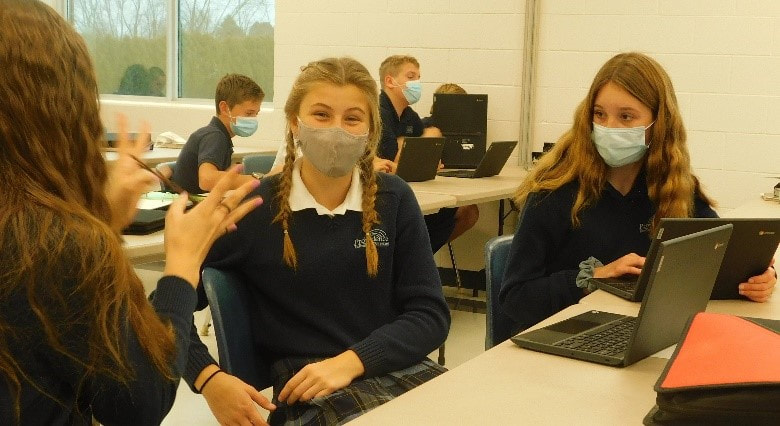 Dear students, parents, and staff. Crew has been an important part of our school year, whether it’s been our daily crew meetings, or whether it’s been the conversations that many of us have had around crew as school culture. We are all crew members, not passengers, on this ship called Providence. We all have a role and a job to do, and we do so together. It’s part of living and working in community and loving and serving one another. I’ve loved this part of school, and I miss our crew meetings. I miss my crew. We can do some of this online, and so I encourage you to keep up the conversations and the meetings and the face time. Hopefully, we’ll be back soon. On January 12, we listened to Premier Ford talk about COVID projections in Ontario, declare a state of emergency, and issue a stay-at-home order. We will be listening again on January 20, when he’ll announce which regions can return to class on January 25. Due to the uncertainty of next week, the board and administration has made a decision to cancel exams this semester. Here are some important details:
Due to the cancellation of exams, we are also looking to make a change to the calendar for the first week of semester 2.We are planning to start the second semester a day earlier on Tuesday, February 2, rather than Wednesday. This will give us a PD later on in the semester – the date has yet to be determined. We’ll have more details about the first week of the semester after Premier Ford’s announcement on January 20. In the meantime, stay safe, call a friend, and enjoy a walk. Wishing you a blessed week. MVD 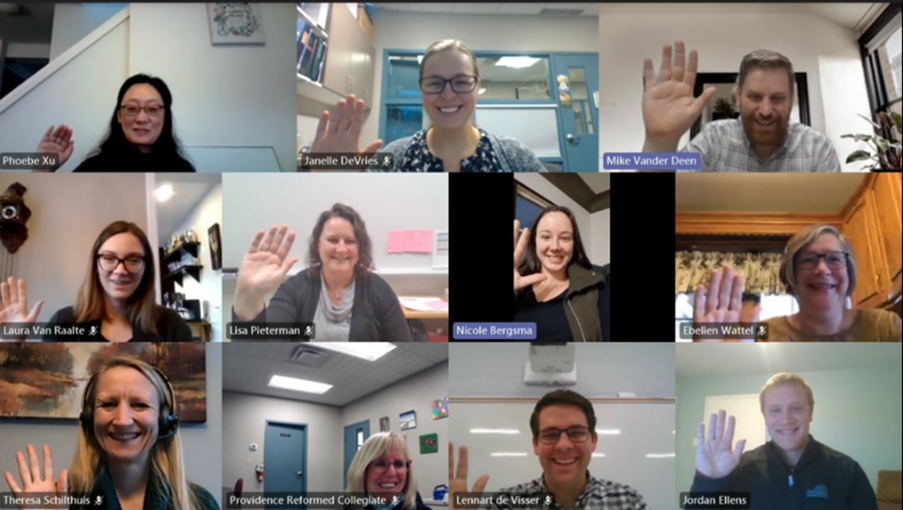 As we return to learning in 2021, I want to wish you and your family a blessed new year. My prayer for 2021 is that this will be a year of growing in knowledge, understanding, wisdom, and faith for all students and staff, and that students would grow in their understanding of what it means to live for the King and for His Kingdom. Our staff continues to meet each day for devotions (online), and we have started a study on the books of Ezra and Nehemiah. Ezra 1:1-4 ESV:
This is a great encouragement here, even in these opening verses of Ezra. What a comfort to know that God holds the kings of the earth in His hand, and that He stirs the spirit of kings to accomplish His purposes. He does so by His Word. Remember that, “The king’s heart is a stream of water in the hand of the Lord; He turns it wherever He will” (Proverbs 21:1).
And then see how God uses His people to build His kingdom. He calls these exiles out of Babylon and returns them to Jerusalem for a great Kingdom-building project – to build the temple. Ezra 2 is a beautiful list of exiles – first the ‘laity’, and then the priests, Levites, temple servants. Each family is named and each person is numbered. Our God knows us by name and by number, and He takes us from exile for service in His Kingdom. Look also at how He equips His people for service. Each survivor was able to take silver and gold and goods and beasts, that they would be provided for in their service. God still builds His Kingdom today, and He calls His people to service. What role do you and will you have in the building of the temple? What section of the city wall has been allotted to your family? How is He providing for you today so that you can take up this task? So, as we move online again (hopefully for just three weeks), let’s remember the big picture of what God is doing. He is building, speaking, providing, and calling. Let this continue to be a time of growing and working and serving. 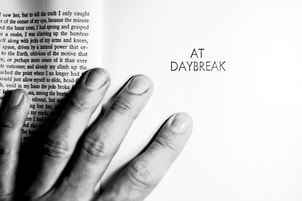 Stories are powerful teaching tools because they grip our imagination; they get a hold of our hearts. Lectures may tell someone what is right and wrong, but stories will make us feel it. Jesus often used parables in His sermons. Stories can make us love the good and pursue it. In fact, good literature must do that. The reverse is also true: bad literature can make us hate what is good and love what is evil. So we must be careful, as Christians especially, to use the gift of language and story-telling well. The goal of the short story unit in the English 11U course this past semester was to craft a story that would “delight and instruct” the reader. Students developed their ability to make stories interesting, descriptive, and exciting – but the challenge was to weave a meaningful theme through the plot, characters, and conflict. This is quite the challenging feat to accomplish! It is always exciting for me as a teacher to see the great creativity of students expressed in their short stories, and it is a shame that others often miss out. This year, a few students agreed to share their work with the community. We hope you enjoy them – but more than that, we hope you find some instruction in these stories. Mr. de Visser
What does it mean to pursue a calling? As Christians, we believe that God calls each individual to pursue a task on this earth. Thankfully, we have a heavenly Father who places each of His children in areas where they can best serve Him and use their gifts and talents for others. Knowing that God plans all things according to the good of those who love Him, we can be confident that He will entrust us with positions in His earthly kingdom that will further His heavenly kingdom. This also means that we should be able to enjoy and love where God has placed us because He has given us the means to do so. Pursuit of a Calling has at its heart the hope that students will be able to get a taste of what interests them, what career they feel called to, and the area of employment where they can be tools in God’s greater plan.
Thursday, November 21 was a notable day at Providence. Pursuit of a Calling, which only occurs every two years, was held. Twenty-seven speakers arrived at PRC throughout the day and passionately presented their career paths and different job opportunities to the students. The day commenced with a politically motivational speech from Bev Shipley and was followed by many presenter sessions. The sessions included a balance of careers that can be obtained through university, college, or apprentice education. For example, the students were able to participate in doctor, veterinarian, robotics, diesel mechanic, PSW, electrician, RN, computer programmer, child and youth worker, counsellor, hairstylist, and Christian outreach sessions (just to name a few). This year, students had the opportunity to go on a bus tour to the Wyoming area which included visits to The Cheese House, Plympton Plumbing, Broadway Service, and Sipkens Nurseries. While 11 students spent the day touring those businesses, the rest of the students at PRC participated in the different career sessions of their choice. At the end of the day, Pastor Tim Bergsma encouraged the students and staff with the reminder of their purpose and calling as Christians. – Mrs. Nicole Bergsma Our school’s mission is to glorify our covenant God by assisting parents in:
If we are going to be intentional about shaping heads, hearts, and hands for Christ, then we need to be designing formational learning experiences for that purpose. Nicholas Wolterstorff challenged Christian schools, saying: “It is nothing but a pious wish and a grossly unwarranted hope that students trained to be passive and non-creative in school will suddenly, upon graduation, actively contribute to the formation of Christian culture.” One way that we are trying to tackle the challenge of our mission statement is by designing Bridge Days – a full day for each course that is designed to engage our students in real and meaningful work, and to shape head, hearts, and hands. We would like our students to be engaging with real people and real needs. We want to bridge the chasm that sometimes exists between our classroom and the world outside our school walls. This is a new initiative for the teachers at Providence, and we have been learning lots through the first two Bridge Days. It’s a significant organizational challenge. It’s also a challenge to come up with authentic bridging experiences that connect our curriculum with real work. We’re “yetting”… we’re not yet there. But it is our hope that these Bridge Days become an important part of the learning and practicing at Providence, and that through these Bridge Days, we nurture in our students a great desire to be a peculiar person and empower them for life-long service in the Kingdom of God as ambassadors of Christ in this world. Below are some blurbs from teachers about the Bridge Days we've had so far. Enjoy. MVD English 11 University – Mr. de Visser: As part of our Short Story unit, the goal of this bridge day was to develop our ability to use descriptive writing – “show, don’t tell.” Students took a bus to Covent Garden Market in London for the morning. The goal was to soak up as many sights, sounds, smells, flavours, and other sensations as possible. It was nice to enjoy coffee, eat cheesy bureks, and look at all the interesting people. We returned to Providence for lunch and spent the afternoon writing short stories based on our morning experiences. Students are currently using these skills as they write their short stories. Business/Computers – Mrs. Pieterman: Last Friday, our Computers class boarded the bus and headed downtown London. Our destination: Start.ca. Our mission: find out how the Internet works, and how it gets into our homes. Start.ca is a local Internet Service Provider (ISP). They actually host part of the Internet right in their building downtown! At Start.ca we learned that the Internet was originally invented as a defense strategy. During the 1960’s during the Cuban missile crisis, the US Department of Defense needed a way to communicate with their nuclear missiles that did not involve a vulnerable physical connection. Scientists from four universities developed the first network – and the first thing that was sent on the network was a cat video! We got to see and handle both copper cable and fibre optic. Most Internet infrastructure is being transitioned to fibre optic because it is much faster and more reliable. One strand of fibre optic cable is much thinner than a human hair and can transport unlimited amounts of data. We toured their offices and learned about the various departments that are involved in their company and the services they provide. We also noticed that the Start.ca offices are very ergonomic! After lunch, we spent some time discussing Microsoft Office and the different applications that it involves. Many of them are used at Start.ca in order to keep their company running smoothly, and it’s important for our students to have a basic knowledge of them as well. It was an informative day of learning and information! I think we all learned something new, and the students appreciated being out of the classroom and learning how an ISP works. Family Studies 12U – Mr. Pennings: Since this was the first ever Bridge Day at PRC the students and I were understandably nervous as we headed out the door into London to conduct survey field work. The students had worked hard at preparing their surveys by following the fundamentals of conducting survey work in the Social Sciences. Their surveys have a silent research question which they will be able to prove or disprove when they present their results to the class. So, off we went into London to have the surveys filled in. Some groups went to Western campus, other groups went to North London at Masonville mall, and other groups went to Victoria Park in downtown London. All the groups were done gathering results earlier in the afternoon, when we started to head back to school. Generally, this Bridge Day was a valuable learning experience. The exercise of formulating a survey was challenging for the students, but it really forced them to think creatively about how to analysis the perspectives of individuals within our society. It was also valuable because it forced the class to actually interact with others who have different values, views, and positions on many different topics. Lastly, it was a very effective way to gather real data from the community so that the students can begin to write up their results from the surveys into a report which will be presented to the class. Leadership 12M – Mr. Pennings: This course promotes recreational leadership within all segments of society. For the Bridge Day we went to Standing Stone Elementary School in Oneida Nation of the Thames. The students in the Leadership class had prepared a simple lesson plan to be able to lead gym classes for the elementary students. The class was broken into groups and assigned a grade level to help them prepare their lesson plans. Some groups taught basketball to the older Indigenous students, while others led simple little children's games for the younger students. The most popular game was a number of variations of dodge balls games which all students love to play. This Bridge Day helped our students to make a connection with others outside of our community. That in and of itself was a very valuable experience. It was a good learning experience for both our students and the students at Standing Stone to break down some of the superficial barriers between Indigenous and non-Indigenous groups. The medium of play/recreational activities is a good way to begin to build connections/relationships with others. English 11C – Miss Schilthuis: We are studying the novel The Cellist of Sarajevo, which is set in war-time Bosnia, so our class met with four Bosnian immigrants at the London Bosnian-Canadian Islamic Centre. The students prepared interview questions on various topics, looking to gain first-hand information on the setting and plot. Before the interviews, we discussed having empathy towards different cultures and life experiences, and we practiced interview skills such as rephrasing and clarifying questions, the use of effective non-verbal communication, etc. The students worked in partners for the interviews and were able to hear first-hand from people who lived through the war, who had family living in Sarajevo during the siege, who served in the military, and who had experienced great loss and growth as a result of this experience. The students were also able to learn more about Bosnia and Sarajevo today, as some of the interviewees travel back and/or still have family in Bosnia. The interviews added so much depth to our book study and made the historical setting of the novel come alive for us. It created gratitude for peace, a deeper understanding of our novel, and a sense of empathy toward people who have experienced hardships. We are grateful for this experience; the students are in the process of creating summary report posters to display some of what they learned. Bible 9 – Mr. MacKenzie: Bible 9 participated as a class in creating two poster illustrations of the Psalms, one made by the students for Trillium Village retirement home in Strathroy, ON, and one made with the Trillium residents for PRC. As part of our unit on the Poetic books of the Old Testament, Bible 9 spent our Bridge Day delving into the Psalms. We started with sharing our own prepared reflections on our favourite Psalms with each other in a variety of different ways. Students discussed the poetic nature of the Psalms, their various uses--i,.e. history, doctrine, supplication, teaching and admonishing, and corporate singing. We spent the rest of the morning still at school, progressing through a drafting process toward creating a poster of Bible 9's favourite Psalms with contributions from each student. In the afternoon, we visited Trillium Village and discussed with the seniors their own favourite Psalms and what they have meant in their lives. Between discussing, reading, and singing the Psalms as a class and with the seniors, students grew in familiarity with and appreciation for this unique portion of God's Word. Chemistry 12U – Ms. Xu: Our chemistry 12 students went to visit London Wastewater Treatment Plant on our second Bridge Day. We toured the whole plant station by station and were shown the details how each station works. We learned how important it is to the community. Students came back with deep understanding of chemical processes and uses of chemicals. Extensive research was done for the societal and environmental impact by the plant. Parent Detention Days?
My kids came home from school one day in October, proudly declaring that the next two days were “PD Days”, which they said stands for “parent detention days”. I was amused... and a little sad. So, I thought it would be good to share with you what we do on these days and why it’s worth giving the parents a detention for the day (haha)! Our professional development has focussed on:
Last week Thursday, our staff discussed at length a portion of Humanizing the Education Machine. Our conversation on that day was about what it means to communicate and promote a greater culture of care at the school. We care, and we are looking for ways to show it. We look forward to engaging parents on this topic in the future too. We also reviewed our latest Bridge Day to see what went well and how we could be doing this better. On Friday, we attended the teacher’s convention hosted by the League of Canadian Reformed School Societies. Our staff heard a keynote speech from Dr. David Zietsma from Redeemer University on the importance and value of Christian education at the elementary, secondary, and post-secondary levels (by the way, grade 12 students, have you considered Christian universities like Redeemer or Dordt? I believe these schools have a lot more to offer than we sometimes give them credit for…). Teachers also attended a variety of workshops that were more specific to their areas of expertise. Convention days are very helpful, and we come back to school the next week chatting about various ideas for our classrooms and our hallways. One exciting PD day coming up will take place on November 22. I have been working with the principals from our sister schools in Fergus, Hamilton, and St. George to plan our very first collaboration day. We hope and intend that this will become an annual event. Each school will be hosting different departments (Providence will be hosting math, science, and learning assistance teachers). We plan to spend the morning in discussion on what it means to “teach Reformed”. In the afternoon, we will brainstorm how we can collaborate better together, either by sharing lesson and unit plans, sharing assessment strategies, etc. We think that we can be better together; we just need time and space. Our teachers are peculiar professionals. We get excited about this kind of stuff. We think it has a big impact on what goes on at Providence, and we look forward to ongoing professional growth to help us serve our community better. MVD I think most Christians feel their Christian peculiarity the most in their workplaces. Work gives us a place and a long period of time where we form connections with non-Christians; it’s where others notice our peculiarity. Some of our students have part-time work, and many of them start to notice their own peculiarity there. Do we cherish this peculiarity, or do we feel the temptation to conform to a different story and a different people?
This November, we are looking closely at peculiarity in the workplace. On November 21, we will have our Pursuit of a Calling day, where students consider different career opportunities for themselves. Our assembly this week was on the topic of “Peculiar in Work”. This assembly was different than most. We started with a brief review of a Biblical foundation for work and questions to work through when considering a vocation, and then we had a panel of guests with a variety of experiences of peculiarity in the workplace. We’re very thankful that Kim Pennings (DSW), Rik Haklander (mechanic), Calvin Schouten (business owner), and Phil Dekker (engineer) agreed to sit on our panel and take questions from our students through a moderator. It was a powerful assembly. We are thankful for the honest responses and the shared thoughts from each panellist. They took questions about the challenges of being a Christian at work, how being a Christian impacted their choice of work, and how others respond to their faith. They also were able to share the joys of peculiarity in the workplace, and even the benefits. Students and staff appreciated the very practical nature of this assembly, and we look forward to future discussions and reflections from this assembly in the week(s) to come. Thanks, again, to our panellists, for taking time out of their work schedules to join us for the assembly. You were a blessing! MVD  It sometimes seems like there is a chasm between classroom learning and real life. We occasionally get questions like, “Why do we need to know this?” or “When are we ever going to use this in real life?” This coming fall, we will work at bridging that chasm by starting “Bridge Days” at Providence. They will also be a great way to engage our students in real work – work that serves real people with a real need. On a typical day at Providence, students have four 80-minute periods where they study four different courses. On a Bridge Day, students will spend the entire school day in one course. We plan on four Bridge Days each semester – one for each course. The Bridge Day might take the form of “field work,” where student learning and activities will take place off site, or the Bridge Day might stay on-site, but then we will be looking for ways to bring experts or community members into the school so that we’re still bridging student learning to the real world. Examples of Bridge Day work could include:
Our students are well-situated within a community of school supporters and the wider community of Middlesex Centre. There are lots of opportunities to reach out to people working in the field, experts in a specific area of study, or community members who would benefit from our service. Bridge Days will be about using these connections to provide our students with an opportunity to do real work for real people with real needs. Bridge Days will be an opportunity for our students to practice being active and creative, to practice actively contributing to building Christian culture. And we expect that this will move us forward in our mission of preparing our students for a life of service in God’s Kingdom as ambassadors for Christ. 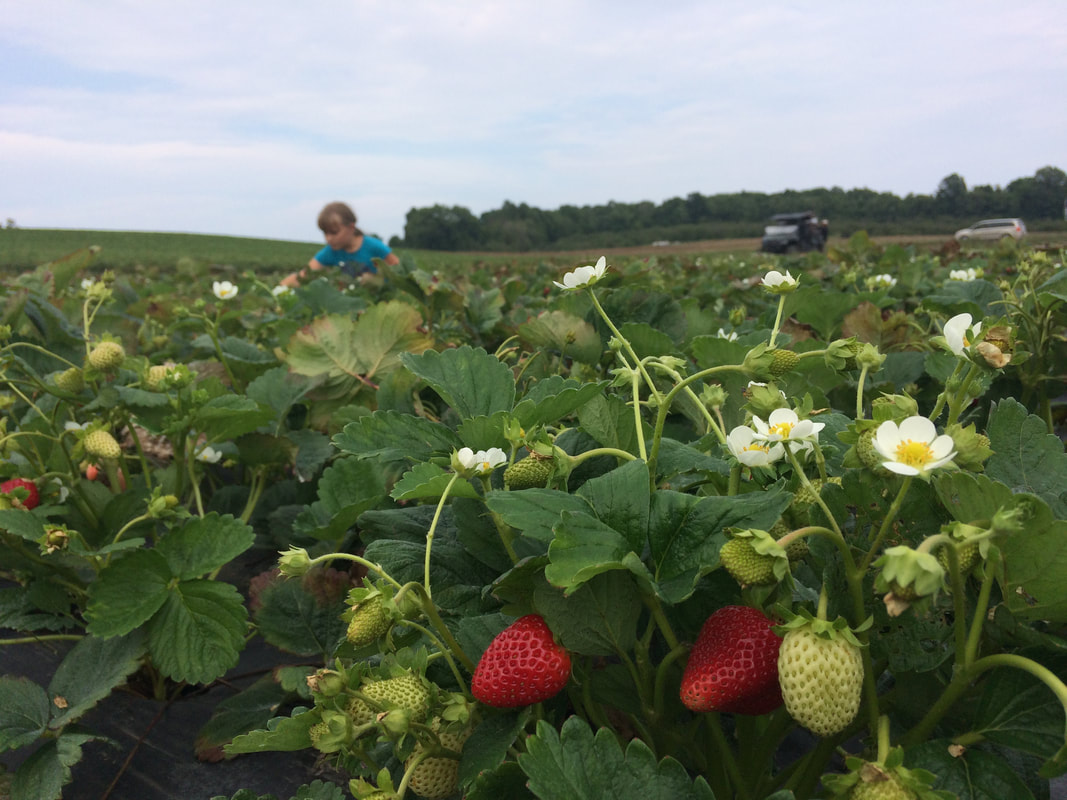 Have you met Steven and Sydney, our two student leadership team co-presidents for 2019-20? They’re a peculiar pair. How about Ella, Zoe, Wade, Samantha, Jacinta, or Kira – the other members of our student leadership team? They make a peculiar party. Have you met Mr. Ellens? He’s on the SLT, and he’s pretty peculiar too. Come to think of it, there are a lot of peculiar people on staff. Miss Petrusma is my peculiar principal partner. This fall, I’ve gotten to know our incoming Grade 9 students in my art class. There are a lot of peculiar people in Grade 9. I’ve known the students in Grades 10-12 for a while longer; there are lots of peculiar pupils in those grades too. In my six years at Providence, I’ve gotten to know a lot of parents and grandparents. Lots of peculiar parents and peculiar predecessors. This past spring, I attended a workshop on the topic of peculiar people and Christian schools. The workshop leader read to us 1 Peter 2:9 from the KJV, which reads: “But ye are a chosen generation, a royal priesthood, a holy nation, a peculiar people; that ye should shew forth the praises of him who hath called you out of darkness into his marvellous light.” The presenter talked about how this peculiar people were part of God’s story – the story of God’s covenant and peculiar people that we find in Scripture. This story won’t be complete until Christ returns, and God’s covenant promises to His peculiar people are completely fulfilled. And so, as God’s people today, we are called to be peculiar. What makes us peculiar? It’s that we are God’s people, called to be His ambassadors and image-bearers to the world today. This unique identity should make us peculiar in all sorts of ways. We should be unique in who we worship. Unique in how we build community, pursue understanding and wisdom, play in athletics, participate in the arts, seek entertainment. We’re unique because we have new life in Christ – we have the gospel. It’s our unique identity that makes us peculiar in the eyes of the world. Someone wrote, “The primary goal of Christian education is the formation of a peculiar people – a people who desire the Kingdom of God and thus undertake their life’s expression of that desire.” We want to invite students to explore their role in God’s Kingdom story, we want to nurture them to desire to be a peculiar person, and we want to empower them to practice their life’s expression of that desire. It’s my deep hope for each student this year that they will wholeheartedly embrace their peculiarity in Christ. Let’s pray for that.
|
Archives |
||||||||||||||||||||||||||||||

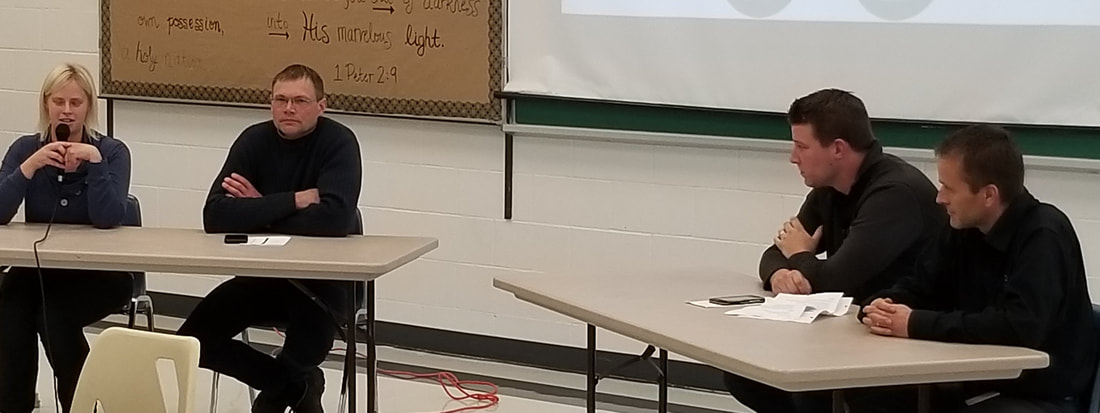
 RSS Feed
RSS Feed